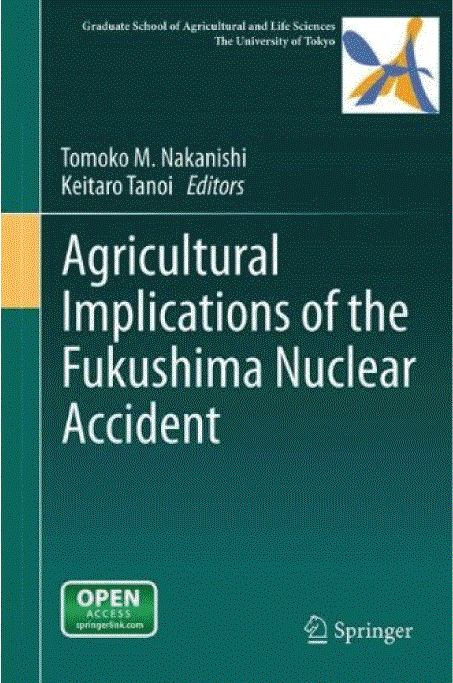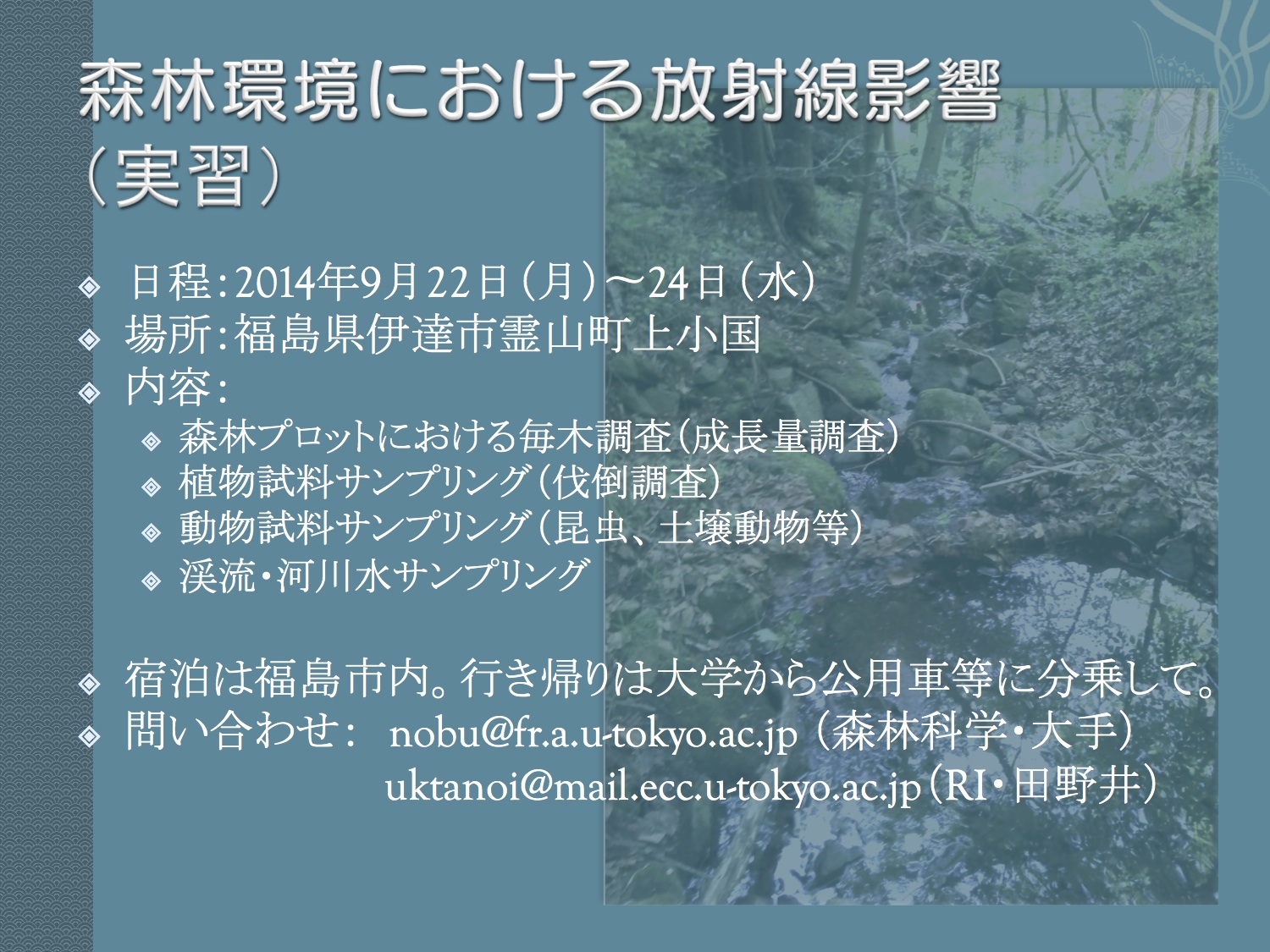Since most of the contaminated area by radioactive materials from Fukushima Daiichi NPP accident is agricultural places, such as farm- lands, forests, or ocean, one of the highest priorities should be given to recover agricultural activities and to secure the safety of foods. Soon after the accident, our faculty had started survey work and in situ researches of the radioactive fallout. Based on the brand-new and Fukushima specific results, development of an educational tool is now expected to provide actual information in agricultural sciences, effectively. Our forum group is targeting to produce both practical experts and future leaders in the agricultural society.
| Seminar | Seminars of Effect of Radioactivity in Agricultural Environment(graduate) / Effect of Radioactivity on Agricultural Environment(undergraduate) |
Monday [18:30-20:10], Bldg No.2 Lecture Room Chem.3 textbook: We will give out handouts on classes. Some downloadable handous are availabe on here. Reference book: Agricultural Implications of the Fukushima Nuclear Accident(available to download free): 
A book about our graduate school's survey of radioactive materials in Fukushima. |
| Field work | Effect of Radioactivity in Forestry Environment |
date: from 22th to 24th September, 2014 venue: Date city Fukushima pref. practice: 1) complete enumeration(every tree measurement), 2) plant sampling, 3) animal sampling (insects and soil organisms), 4) stream water sampling expense: TBA (excluding food expenses) further details(in Japanese) 
|
|
Special seminar: Monitoring radiation exposure of free-living wildlife -why and how?-
Wildlife suffers various kinds of effects and stress from its environment. At the radioactive contamination area in Fukushima, the radiation is added to those other conditions. Surveys on the free-living wildlife, often, gain discriminate results from those in the laboratory experiments. Some functions of low level, long term, internal radiation effects have been introduced for the wildlife at Chernobyl contamination area. Although the radioactivity is lower at Fukushima than that at Chernobyl, we have started our surveys soon after the accident. We have also some good information of the radiation fallout and radioactive dynamics in the ecosystems. Members of three wildlife research groups and others will discuss, “Why and how do we research on the wildlife?”
DATE: 16th Nov, 2013
TIME: 14:00~18:30
VENUE: room 231-232, #7B Bldg.,Yayoi Campus, University of Tokyo
organizer: Effect of Radioactivity in Agriculture Forum Group (AGRI-COCOON, Graduate School of Agricultural & Life Sciences, the University of Tokyo)
collaborator: Voices for Lively Spring
language: Japanese and English (simultaneous translation in part)
others: admission free / advance application is not required
speaker:
Timothy A.Mousseau (U. of South Carolina)
Ken Ishida (U. of Tokyo)
Fumio Yamada (FFPRI) & Morihiko Tomozawa (Keio U.)
Others, who visit the place
Symposium: Society for Resurrection of Fukushima, activity report meeting:
Reconstruction of Fukushima by empowerment of the villager ~ How should collaborate disaster sufferers, supporters and specialists?
More than two years and a half passed from the nuclear power plant disaster.
“Two years and a half” are too much long time for the village people leading refuge life.
However, all thing have been pending, the prospect for reconstructing livelihoods is still nowhere in sight.
This symposium will be an opportunity to access to vivid information which mass medias hardly report, such as the current surroundings of the village, the relationships with governments (especially national governments or the prefecture) and the vision of reconstruction by the villager themselves.
We hope hope you will attend.
DATE: 8th Oct, 2013
TIME: 16:00~18:30
VENUE: room 231-232, #7B Bldg.,Yayoi Campus, University of Tokyo
Organizer: Society for Resurrection of Fukushima
Co-sponsor: AGRI-COCOON
Agenda:
【Session 1】
Speech by Tadashi OGAWA,
‘current basic information Iitate Village’
【Session 2】
Keynote speech by Yoshito KANNO (formerly member of a village assembly)
‘Resurrection of Iitate Village’
【Session 3】
Keynote speech by Muneo KANNO
‘Efforts on reconstruction project for Iitate Village’
【Session 4】
Speech by Masaru MIZOGUCHI (professor, International Agro Informatics Laboratory, the University of Tokyo)
‘roles of specialist and volunteer staff’
【Session 5】
Speech by Tomiko SAITO (member of circle Madei)
‘roles of volunteer staff’
~Thoughts into the Future by the Younger Generation~
What was Iitate like before the nuclear disaster, and what changed with it?
What are our projections for Iitate’s future?
In this symposium, we will address these questions with 2 young guests from Iitate village.
DATE: 19th May, 2013
TIME: 13:00~15:00
VENUE: Yayoi Auditorium Annex, Yayoi Campus, University of Tokyo
Co-sponsor: AGRI-COCOON
Agenda:
【Session 1 (13:00~13:20)】
Keynote speech by TAKAHASHI Wako, formerly living in Iitate
‘Life before and after the earthquake’
【Session 2 (13:20~13:40)】
Keynote speech by SATOU Sota, formerly living in Iitate
‘What I would do as the Iitate village mayor’
【Session 3 (14:00~15:00)】
World-café style discussion with audience participation
‘What do we think of the future of Iitate?’
outline and details(in Japanese)
outline and details(in Japanese)
Seminar 01: "Radioecology on the Savannah River Site: Past, Present, and Future
(Dr. Olin E. Rhodes, Jr., Director and Professor). "
May 1, 2012 16:45 - 18:00 Room Chem-3, Agri. Bldg. 2
Seminar 02: "Life in a changing world, - science to foresight the world after the disaster of earthquake, tsunami and atomic reactor breakdown (Prof. J.C. Wingfield)."
June 1, 2012 13:30 - 17:45 Nakashima- Memorial Hall
Symposium: "Nuclear accident and students - Having a think from Tokyo"
December 1, 2012 Morning: start 11:00 / Afternoon: start 13:30 Nakashima- Memorial Hall
| Forum Group Leader: | Tomoko M. Nakanishi |
| Secretary General: | Keitaro Tanoi |
| Name | Laboratory | Department |
| Keisuke Nemoto | Agriculture and Environmental Biology | |
| Toru Fujiwara | Applied Biological Chemistry | |
| Nobuhito Ohte | Forest Science | |
| Hideki Ushio | Aquatic Bioscience | |
| Toyoji Kaneko | Aquatic Bioscience | |
| Sho Shiozawa | Biological and Environmental Engineering | |
| Seiichi Oshita | Biological and Environmental Engineering | |
| Taku Nishimura | Biological and Environmental Engineering | |
| Masahiro Samejima | Biomaterial Science | |
| Masugi Nishihara | Veterinary Medicine | |
| Masaru Mizoguchi | Global Agricultural Science | |
| Ken Ishida | Ecosystem Studies | |
| Hiromi Hosono | Agricultural and Resource Economics | |
| Eriko Yasunaga | Institute for Sustainable Agro-ecosystem Services | |
| Daisuke Takada | Institute for Sustainable Agro-ecosystem Services | |
| Toshihiro Yamada | The UT Chiba Forest | |
| Noboru Manabe | Animal Resource Science Center | |
| Tomoko M. Nakanishi | Radioisotope (RI) Center | |
| Keitaro Tanoi | Radioisotope (RI) Center | |
| Naoto Nihei | Radioisotope (RI) Center | |
| Natsuko Kobayashi | Radioisotope (RI) Center | |
| Atsushi Hirose | Radioisotope (RI) Center | |
| Nobuyuki Yagi | Global Agricultural Science | |
| Tsuyoshi Ogawa | Radioisotope (RI) Center | |
| Satoru Miura | Radioisotope (RI) Center | |
| Tetsuya Tanaka | Animal Resource Science Center |
-----------------------------
Contact: Business Office: Bldg.#3, 105A, Graduate School of Agricultural & Life Sciences
TEL 03-5841-8882 office[at]agc.a.u-tokyo.ac.jp